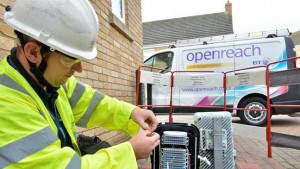
After more than 40 years of operation, DTVE is closing its doors and our website will no longer be updated daily. Thank you for all of your support.
UK government rejects BT’s £600 broadband offer in favour of regulation
The UK government has rejected BT’s offer to voluntarily invest up to £600 million to deliver 10Mbps broadband to 99% of the UK by 2020, instead opting for a regulatory Universal Service Obligation (USO).
 The government said that after careful consideration it had decided that regulation is “the best way of making sure everyone in the UK can get a decent broadband connection of at least 10 Mbps as soon as possible.”
The government said that after careful consideration it had decided that regulation is “the best way of making sure everyone in the UK can get a decent broadband connection of at least 10 Mbps as soon as possible.”
The move grants UK residents a legal right to broadband speeds of 10Mbps, meaning that every home and business not getting this level of service is entitled to request it.
In the summer BT offered to provide near UK-wide coverage in a bid to avoid USO regulation. It said it would invest an estimated £450 million to £600 million for the upgrades, with the faster service to largely be delivered by its Openreach infrastructure arm.
In a statement published today the government said it welcomed BT’s offer, but “did not feel the proposal was strong enough for us to take the regulatory USO off the table.”
It added that USO offers “sufficient certainty and legal enforceability” that is required to ensure high speed broadband access for the whole of the UK by 2020.
BT said in a statement that it respects the government’s decision and will work closely with the government, Ofcom and the industry to help deliver regulatory USO.
“BT and Openreach want to get on with the job of making decent broadband available to everyone in the UK so we’ll continue to explore the commercial options for bringing faster speeds to those parts of the country which are hardest-to-reach,” said BT.
Culture secretary Karen Bradley said that the USO decision is part of the government’s work to ensure that Britain’s telecoms infrastructure is fit for the future and will “continue to deliver the connectivity that consumers need in the digital age.”
“We know how important broadband is to homes and businesses and we want everyone to benefit from a fast and reliable connection,” said Bradley.
“We are grateful to BT for their proposal but have decided that only a regulatory approach will make high speed broadband a reality for everyone in the UK, regardless of where they live or work.”
The government said it will now set out the design for a legal right to high speed broadband in secondary legislation early next year, with Ofcom’s implementation expected to take two years from that point.

